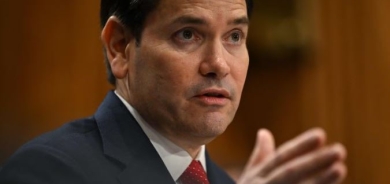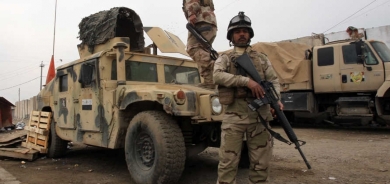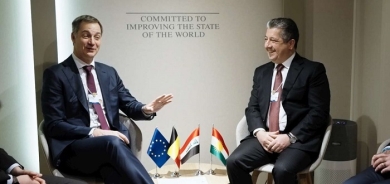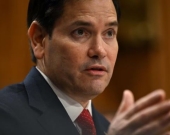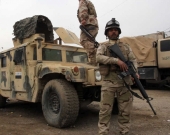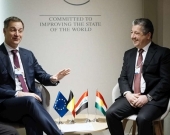Mufti: Kurdish Statehood Is Inevitable

In an interview with Rudaw, Adnan Mufti, a senior Patriotic Union of Kurdistan (PUK) official and former Kurdistan Region parliament speaker, said disputed territories such as Kirkuk should first have a referendum on whether they will join the Kurdistan Region and then be included in a vote on independence — a proposal that could create more populous and much wealthier nation.
Despite murky messages from the PUK on statehood, it’s inevitable that Kurdistan will become independent, Mufti said, in part because there’s a “lack of will” from Baghdad and Erbil for Kurdistan to remain part of Iraq.
Rudaw: Kurdistan Region President Massoud Bazrani assigned the parliament to hold a referendum on the future of Iraqi Kurdistan. What is your position on this issue?
Adnan Mufti: We support the referendum. We have discussed this issue both in the parliament and in our meetings with the president. We believe that the Iraqi constitution has repeatedly been violated. On the one hand, we still suffer from unresolved issues with Baghdad and at the same time, the threat of ISIS (the Islamic State in Iraq and Syria) and terrorism for Iraq is grave. Now, should the Kurdish leadership be indifferent to these events or should we exercise our natural right to self-determination?
We believe that the Iraqi constitution has repeatedly been violated.
We still believe that if Iraq upholds the principles of federalism, then we as Kurds will respect the sovereignty of Iraq and won’t break away from it. Naturally we as Kurds would benefit from a federal and democratic Iraq. But because this might not be the case, the Kurds would be better off to consider other options.
Rudaw: Do you think the timing is right to hold a referendum on self-determination?
Adnan Mufti: Yes, I do. The international community should recognize the fact that our people have the right to freedom, democracy and independence, when clearly democracy and federalism are not enshrined in Iraq at the moment. A referendum does not necessarily mean immediate independence. A referendum reflects the popular will and opinion regarding central issues that affect the lives of our people. This means that if talks with the Iraqi government prove futile, then elected Kurdish leaders can turn to the outcome of the referendum to guide them.
Rudaw: What will you hold the referendum on: a Kurdish state or a confederation?
Adnan Mufti: It very much depends on how things turn out. If Iraq is gradually divided due to the Sunni-Shiite armed conflict, and if Baghdad and Erbil can’t reach an understanding, then of course we see it as our natural right to declare independence.
Let me be frank: I really don’t see how we can remain part of Iraq when there is clearly a lack of will on both sides. The Iraqi constitution states that the country will remain united only if the constitution is respected and upheld. This, undoubtedly, is not the case now. Kurdistan as an independent state won’t be a threat to any nation. This is a fact and our neighboring countries in particular are guaranteed this. We want to create a state in full harmony with other nations. We have no intention to pose a threat to the sovereignty of other nations.
Rudaw: Will the referendum go ahead?
A referendum reflects the popular will and opinion regarding central issues that affect the lives of our people.
Adnan Mufti: Well, let me answer it this way: holding a referendum shouldn’t be a difficult task. We basically ask our own people what their opinion is on the creation of a Kurdish state. If the region responds “yes” to the question, then it will be up to the elected Kurdish leadership to decide what to do.
Rudaw: But Iraqi Prime Minister Nouri al-Maliki said he wouldn’t accept a referendum on Kurdish independence because he said it’s not in the constitution.
Adnan Mufti: This isn’t what it’s about, really. We should respect the will of the Kurdish people. What has the Iraqi constitution done for the Kurdish people? Is there justice and equality in Iraq because of this constitution? What about power sharing and the rule of law? Who runs the Iraqi army?
Iraq is no longer a united country; the reality is that we already have three nations. Even if the Kurds would like to stay within Iraq, I really doubt the Sunnis and Shiites would choose to live together in the same country. No one can block the referendum. If the Kurds finally make up their mind on independence, then they should also expect different reactions from both Iraq and the international community.
Rudaw: When will the referendum take place?
Adnan Mufti: First we have to establish the electoral committee. Then we have to guarantee both the Turkmen and the Arabs of Kirkuk that their rights and interests will be safeguarded, if a referendum favors annexing Kirkuk to the Kurdistan Region. This is why we should hold a referendum in the so-called disputed areas outside the Kurdistan Region regarding their future.
And then we should hold a region-wide referendum in all of (Iraqi) Kurdistan. Hopefully it will be completed within a year. But of course the stance of the incoming Iraqi government is key.
Rudaw: The Patriotic Union of Kurdistan (PUK) enjoys good relations with Iran. Has the PUK persuaded Iran that the creation of the Kurdish state is not a threat to Iran’s sovereignty?
Adnan Mufti: Both Turkey and Iran are regional powers and have, in the past, opposed an independent Kurdistan. But the conditions are indeed different now and we have tried to have good relations with both countries. We’ve made progress. We certainly should assure Iran that a Kurdish state isn’t against their interests.
Rudaw: High-ranking PUK officials have had different views on the referendum and possible independence. Does that mean that you haven’t made up your mind on the issue?
Adnan Mufti: Well, people have different opinions and that’s only natural. But I don’t think that anyone would violate the PUK’s core principles.
Rudaw: Adil Murad, who is a senior PUK official, said a Kurdish state wouldn’t be created. Is this his personal opinion or that of the PUK?
Both Turkey and Iran are regional powers and have, in the past, opposed an independent Kurdistan. But the conditions are indeed different now and we have tried to have good relations with both countries.
Adnan Mufti: I don’t really think he said anything like that because no one would say such a thing. He might have said that the conditions are not ripe for a Kurdish state. We have said that we aren’t creating a Kurdish state, but rather Iraq as country is disintegrating and what should we Kurds do about our own destiny? Kurdistan has a sustainable economy and can support itself. We don’t want to harm Iraq; it’s others.
Rudaw: Azad Jundiani, also a senior PUK official, said that within the PUK there are two different views on the matter. Some want a deal with Baghdad and some don’t. Which is the prevailing position?
Adnan Mufti: I think all Kurdish parties are more or less divided into these two camps. In principle, all of us agree that we want to continue our talks with Baghdad. However, Baghdad must be prepared to face the challenge of a new era. Let me put it this way: the Kurdish state will, in the very near future, become a reality and even the Arab states will come forward and recognize it.
Rudaw: But what is the top priority for the PUK: Iraq or independence?
Adnan Mufti: The PUK will support whatever the rest of the Kurdish parties will agree on. And with regard to Baghdad, the PUK still believes in dialogue.
Rudaw: What about you? What is your position?
Adnan Mufti: I think our united Kurdish position is important and our dialogue with Baghdad is significant as well.
Rudaw: Will the PUK support Maliki for a third term in office?
Adnan Mufti: We should have a united position in our talks with Baghdad. Obviously, it would serve everyone if the Shiite groups agreed on a different candidate. For us as Kurds, it really doesn’t matter if the prime minister is Maliki or someone else. What is important is our rights and destiny. I personally think that Maliki should step down because I don’t really think he can solve (Iraq’s) problems. And it’s not just the Kurds but also the Sunnis and the Shiite Sadrists who also want Maliki to step aside. Frankly, Maliki is part of the problem, not the solution.
Rudaw


